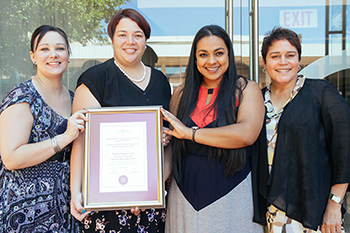Latest News Archive
Please select Category, Year, and then Month to display items
12 January 2024
|
Story Nonsindiswe Qwabe
|
Photo Sonia Small
 Since joining the UFS in 2008, Dr Grey Magaiza has worked extensively on approaches that can foster the socio-economic transformation of societies.
Since joining the UFS in 2008, Dr Grey Magaiza has worked extensively on approaches that can foster the socio-economic transformation of societies.
“The future should be one where communities can decide on their development agenda and futures. That’s the most important for me.” Dr Grey Magaiza, Deputy Director of the Centre for Gender and Africa Studies (CGAS) and Head of the Community Development programme on the Qwaqwa Campus, is passionate about capacitating communities to be agents of change and advancement. His vision for the future emphasises the empowerment of communities to take charge of their development by actively participating in decision making and the implementation of development projects that can improve their lives.
Since joining the UFS in 2008, Dr Magaiza has worked extensively on approaches that can foster the socio-economic transformation of societies. Over the years, he has crafted his research speciality into one that he is most proud of – being an interdisciplinary scientist immersed in the development of communities.
“I’m in a fortunate position of researching what I like. I say ‘fortunate’, because I’ve taken the time to understand what I’m passionate about, which is the overall field of rural livelihoods and livelihood futures – in short, community development. My research starts from an engaged university, understanding the elements that a university must use to enhance transformation and relevance to its immediate community in terms of development.”
One of the ways he has done this is by looking at social entrepreneurship as a development approach for young people in a rural setting. Through workshops with non-profit and civic organisations in Qwaqwa, Dr Magaiza has been helping these organisations to map out their needs and actively meet them through the involvement and support of external role players.
“We understand that communities are part of the national development agenda, but even that national agenda respects community knowledge and intentions and allows communities to shape their identity. A critical enabler of this is community organising. You bring back the capacity in communities to have dialogues on issues affecting them as spaces for engagement, knowledge exchange, and for people to just talk about their way forward.”
By enabling communities to define their development agenda, they can address their specific needs, challenges, and aspirations, he said. “When I look at livelihood futures, it’s quite an exciting aspect of my work – it’s like looking into a fortune tellers’ globe, because you’re not deciding for communities what they should do, but the communities themselves take those decisions.”
Communication Science lecturers walk away with Best Teachers Award
2015-11-26

The winners: Jolandi Bezuidenhout, Rentia Engelbrecht, Jamie-Lee Nortje with Prof Milagros Rivera (Head of Department of Communication Science). |
Jolandi Bezuidenhout, Rentia Engelbrecht, and Jamie-Lee Nortje are the names behind the award-worthy A-Step programme. These lecturers in the Department of Communication Science at the University of the Free State (UFS) have been facilitating extra class for students in the extended programme since 2008. On 12 November 2015, they celebrated a major milestone when the programme received the Excellence in Teaching and Learning Innovation Award.
The annual awards are hosted by Dr Lis Lange Vice-Rector: Academic at the UFS, and administrated through the Centre for Teaching and Learning (CTL).
It was the first time that the Faculty of the Humanities had received the award. The lecturers were named the Best Teachers in the UFS, emerging in first place in the category: Student Engagement and Learning.
The A-Step sessions form part of a governmental programme dedicated to supporting students by offering diverse curriculum-related activities. Students attend two classes per week where they are equipped with language and life skills. As of 2015, the sessions were expanded to benefit not only the extended programme but all 788 students in Introduction to Verbal and Nonverbal Communication (KOM114).
“The activities are based on theoretical work we do in the mainstream classes,” explained Nortje. Primarily, the activities are meant to “help the student engage the work in a meaningful way so that they can understand it,” she said, which is why the sessions are designed in a fun and creative way.
The ‘Best Teachers’ organised and developed the A-Step sessions collectively and diligently over the years. The award, and the improved students’ academic performance, bears testimony to the effectiveness of their teaching style.
Marissa Grobbelaar, the Academic Staff and Development Project coordinator at the CTL, commended the lecturers’ efforts. Grobbelaar believes that “the way they approached their teaching and the passion which was evident in it,” was one of the reasons they deserved the award.
A former A-Step student, Rorisang Sekhasa, attested that, “the programme was very helpful because you get to have one-on-one sessions with your lecturer, and understand the work better. What was done in class is elaborated on in detail.”